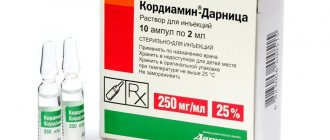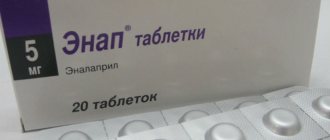Properties of acetylsalicylic acid
Crystalline white powder with a faint sour taste, which is pressed into tablets, or simply diluted with warm water. has many useful properties:
- Antipyretic. By suppressing the synthesis of prostaglandins in the thermoregulation center, blood vessels dilate and sweating increases. The decrease in body temperature occurs quite quickly, within 30-40 minutes. The effect lasts for several hours.
- Painkiller. Aspirin affects pain sensitivity centers and has a peripheral anti-inflammatory effect.
- Antithrombotic. Taking acetylsalicylic acid reduces the content of thromboxane A and slows down the adhesion of blood platelets. Increases the fibrinolytic properties of blood plasma, which promotes the resorption of blood clots and reduces the concentration of blood coagulation factors. vitamin K dependent.
- Anti-inflammatory. By reducing swelling and capillary permeability, hyaluronidase activity and suppressing ATP synthesis, the energy supply to the inflammatory process is limited. In acute inflammatory processes, taking aspirin allows doctors to slow down the expansion of the affected area and take emergency measures.
Indications for use of acetylsalicylic acid
The use of Aspirin can be indicated for various diseases, but the drug is most often recommended for:
- coronary heart disease and its prevention in the presence of risk factors;
- silent myocardial ischemia;
- unstable angina;
- after myocardial infarction to prevent complications and recurrent heart attacks;
- cerebral ischemia and ischemic stroke;
- as a prophylaxis for thromboembolism during mitral valve replacement;
- coronary artery stenting and angioplasty;
- atrial fibrillation;
- mitral valve prolapse;
- Kawasaki disease;
- recurrent pulmonary embolism;
- thrombophlebitis.
Despite its powerful anti-inflammatory and antipyretic properties, Aspirin is prescribed with caution in infectious and inflammatory processes. As an analgesic, the drug is used for myalgia, toothache, migraines, lumbago, neuralgia and thoracic radicular syndrome.
Allergists use aspirin to desensitize and increase the body's tolerance to non-steroidal anti-inflammatory drugs.
Limitations in use
Since acetylsalicylic acid interferes with thrombus formation, its use is undesirable in patients with impaired blood clotting functions, especially with hemophilia. Moreover. the drug has a negative effect on the mucous membranes and can provoke the development of gastric ulcers due to damage.
Aspirin can be used to a limited extent in different age groups, and is also completely prohibited for the treatment of certain categories of patients.
Use of the drug during pregnancy and lactation
In the first trimester of pregnancy, Aspirin is strictly prohibited, as it can have a significant effect on the formation of the fetal central nervous system, as well as provoke bleeding. threat of miscarriage and miscarriage. In the first 12 weeks of pregnancy, the patient is replaced with medications that are taken on a regular basis with the safest ones possible, and if there is a possibility of temporary withdrawal, all potentially dangerous medications are discontinued.
The third trimester of pregnancy also requires a complete ban on Aspirin, but here the drug threatens not only the formed fetus, but the health and life of the expectant mother. Impaired thrombosis function can lead to too much blood loss during childbirth and the death of the mother. For an unborn child, acetylsalicylic acid increases the risk of early closure of the aortic duct and cerebral hemorrhages.
Aspirin is limitedly approved for use from 4 to 6 months of pregnancy, provided that the benefit to the mother outweighs the potential risks to her and the fetus, only in minimal dosages and under medical supervision.
Acetisalicylic acid passes into breast milk, therefore, during lactation, the use of drugs based on it is allowed only when transferring the baby to formula milk.
Breastfeeding while taking Aspirin can cause liver and kidney failure, brain hemorrhages and internal bleeding in the newborn.
Aspirin for children under 15 years of age
The age limit for taking acetylsalicylic acid is introduced for many reasons:
- There is a high risk of internal bleeding in children under 5-7 years of age.
- Children under 14-15 years of age may experience damage to the mucous membranes of the stomach and intestines, and kidney failure.
- Symptoms of a drug overdose may appear even if the doses are strictly followed.
A complete restriction on taking Aspirin in powder and tablet form applies to children under 15 years of age. From reaching this age, the doctor can prescribe acetylsalicylic acid in a daily dose of up to 750 mg.
For patients of any age, it is important to observe the timing of administration - the drug is taken strictly after meals to minimize the risk of damage to the gastrointestinal tract.
Aspirin for hangover
People's love for Aspirin as an anti-hangover drug is associated with the effect of vasodilation and analgesic effect, which brings significant relief during withdrawal symptoms.
Unfortunately, the side effects of such “treatment” lead to liver damage and increase the risk of a critical decrease in blood pressure. If the patient has a history of gastritis or stomach ulcers, the risk of bleeding increases significantly.
Taking Aspirin together with alcohol is strictly contraindicated, since ethanol completely dissolves acetylsalicylic acid. Under the influence of the mixture, blood vessels begin to expand and contract, causing cell hypoxia and the risk of hemorrhages in the brain. Often the negative effects do not appear immediately, leading to irreversible damage.
Contraindications
In addition to the patient’s age and pregnancy period, there are a number of contraindications that must be reported to the doctor and the drug must be changed to avoid complications. Aspirin should not be prescribed for:
- Hemorrhagic diathesis and vasculitis;
- Gastritis;
- Peptic ulcer of the stomach and duodenum;
- Reduced blood clotting, tendency to bleeding;
- Vitamin K deficiency;
- Dissecting aortic aneurysm;
- Severe disorders of the kidneys and liver;
- Hemophilia;
- Individual intolerance to salicylates or allergic reactions to acetylsalicylic acid;
- Arterial hypertension, risks of hemorrhagic stroke.
In other cases, the prescription of acetylsalicylic acid does not pose a direct threat to life and health, but the doctor must decide on treatment with Aspirin.
Side effects
Side effects of acetylsalicylic acid include:
- dyspeptic symptoms: nausea, cramps, epigastric discomfort, lack of appetite;
- noise in the ears and head, weakness, dizziness;
- allergic urticaria;
- in severe cases: Quincke's edema or anaphylactic shock.
Aspirin intoxication develops after exceeding the maximum dose. It manifests itself as increased side effects: hearing loss, dizziness, heartburn, dryness and an unpleasant taste in the mouth.
Difficult choice: how to protect mucous membranes
The antithrombotic properties of acetisalicylic acid are a salvation for patients with the threat of thromboembolism, stroke, ischemia of the heart and intestines. And at the same time, constant use of the drug causes significant harm to the digestive tract, causing a number of complications.
Concerned with this issue, pharmacists around the world are working to create drugs. which will not cause harm to health with constant use, while maintaining the beneficial properties of acetylsalicylic acid. Developments are progressing well, and several generations of safer connections have been released.
One of the most modern and safe for health preparations of acetylsalicylic acid, which fully preserves the antithrombotic effect, is Fazostabil. Antacid effect. protecting the mucous membranes of the stomach and intestines, achieved with the help of Magnesium hydroxide . Compared to Aspirin, the frequency of adverse reactions to the drug is significantly reduced.
prescribe a dosage schedule and minimally effective dosages of Fazostabil to prevent thrombosis and reduce the risks of pathologies from the cardiovascular system.
To monitor their health, patients taking acetylsalicylic acid for life should be regularly examined by a cardiologist and gastroenterologist, self-monitor for changes in blood pressure levels, and undergo annual blood tests to monitor fibrinogen and clotting factor levels.
Purpose of the drug
Doctors do not prescribe Aspirin for high blood pressure, but they do prescribe it to prevent possible complications. The drug helps prevent the development of heart attack and stroke. For hypertensive patients, Aspirin alone is not enough, but for patients with cerebral vascular pathologies, the medication is quite enough. The medicine can dilate blood vessels and stop headaches.
Doctors do not recommend medicine for high blood pressure. “Aspirin” is actively used by cardiologists and is included in standard treatment regimens for pathologies of the heart and blood vessels. Doctors also prescribe it in the postoperative stage after various interventions to prevent the formation of complications.
It is not advisable to take acetylsalicylic acid continuously. For patients with high blood pressure, the medicine helps well if cardiovascular pathologies are detected. In such situations, Aspirin reduces blood pressure. In other situations, therapy with this remedy does not make sense.
If the pressure has increased, in order to reduce it, doctors prescribe other medications: Cardiomagnyl, Aspecard. But their constant use is possible if there is a mortal danger:
- in a post-infarction state;
- there are blood flow disorders in the brain;
- atherosclerosis was detected.
To reduce potential risks, the cardiologist determines which disorder in the body increases blood pressure. Then he prescribes the drug and determines an effective treatment regimen.
Chemical structure of aspirin
The medicine is a non-steroidal analgesic and is effective in eliminating inflammatory formations. It is a popular substance that can help with frequent headaches and migraines. The properties of the drug are aimed at reducing the activity of enzymes that are the cause of many ailments. Positively affects the cerebral hemispheres and areas responsible for thermoregulation.
Structure of aspirin:
- Acetylsalicylic, citric acids.
- Sodium bicarbonate.
- Citrate, sodium carbonate.
- Talc.
The effect of Aspirin on the body of a hypertensive patient has not been fully studied; doctors do not prescribe this medicine for treatment when diagnosing hypertension. But its ability to make blood less often is appreciated by cardiologists. Since the result of consuming acetylsalicylic acid is a reduction in the risk of acquiring serious heart pathologies (heart attack, stroke). Therefore, to the question of whether it is possible to take aspirin with high blood pressure, there is a clear answer - it is possible, but in the intervals between attacks, as a dosage form to prevent pathology or for complex therapy.
To treat hypertension, they resort to similar compositions with a similar name, confirming the inclusion of the same components in the structure, as an example - Aspirin Cardio.
Undoubtedly, the dosage form has an effective effect on symptoms. It is unlikely that it will be possible to cure hypertension or achieve effective effects on blood pressure. Taking the medicine daily can have a positive effect on the dynamics of the disease and slightly reduce the tonometer readings. Good results in the treatment of hypertension can be achieved with complex treatment in combination with more effective drugs aimed at reducing elevated values on the tonometer display.
A cardiologist or neurologist can prescribe a drug for the initial stage of hypertension (90 mmHg). Aspirin can reduce the tonometer readings by several positions, and the reason for this is its ability to thin the blood. The dose is prescribed by the attending physician.
The ability of the drug to reduce high intracranial pressure is invaluable; tablets can cope with this task on their own.



